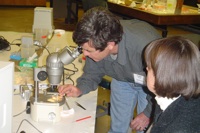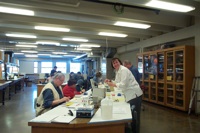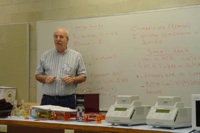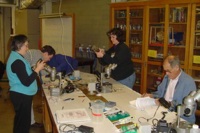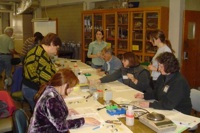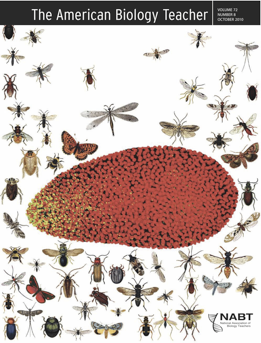Wolbachia in Education
Inquiry, discovery, and technology are key pillars in improving science education. We present an inquiry-based lab project using the worldwide symbiosis between the bacterium Wolbachia and invertebrates. This endeavor, called “Discover the Microbes Within! The Wolbachia Project,” has the following goals: (1) involve students in grade 7 through college in a nationwide effort to collect new genetic information on Wolbachia; (2) provide curriculum, protocols, and training to enhance teachers' ability to lead students through the project; and (3) increase students' understanding of biodiversity, evolution, symbiosis, cell biology, molecular biology, and bioinformatics.
Read about the Wolbachia Project in The Scientist
Education Program Objectives
We are are interested in using Wolbachia as a teaching tool. A major outreach activity has been the development and dissemination of a series of laboratory exercises that can be used to teach integrative biology to high school and college students. The lab series integrates biodiversity, molecular biology, bioinformatics, and evolutionary approaches and include the opportunity for students to make original scientific discoveries in a routine lab exercise, something that generates great excitement among students.
We have developed a set of integrated laboratory exercises that uses Wolbachia to teach biodiversity (insect and microbial), basic molecular methods (PCR, gel electrophoresis), bioinformatics, and molecular evolution (phylogeny using DNA sequences). These exercises emphasize activities and experimental systems that can be used easily and inexpensively in the classroom to teach basic biological principles. They first field tested in March 2005 at a Teacher's Enhancement Workshop that was cosponsored by the NASA Astrobiology Institute at the Marine Biological Laboratory and FIBR: Integrative Studies of Wolbachia-Eukaryotic Interactions; Genomes to Communities and Back NSF 0328363. Annual Workshops are held at the The Marine Biological Laboratory, Woods Hole, MA.
Wolbachia and Biodiversity
Insects are among the most diverse and abundant animals. If the services insects provide everyday (for free) disappeared suddenly, humans would soon disappear. Insects keep us healthy and fed because they clean water, pollinate flowers that produce 1/3 of our food, breakdown waste and decompose plants and animals. Despite their importance, insects remain little appreciated and poorly understood primarily because of their small size. Most of the 1-20 million species (of which only 700,000 have names) are less than 1/3 inch long. This entire world of small creatures exists literally under your feet.

